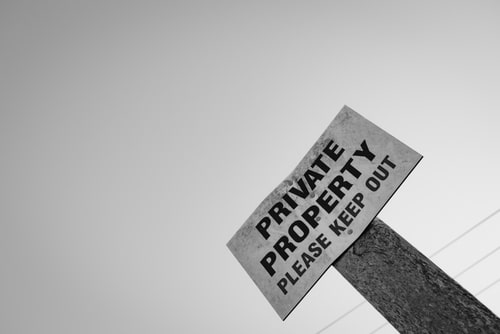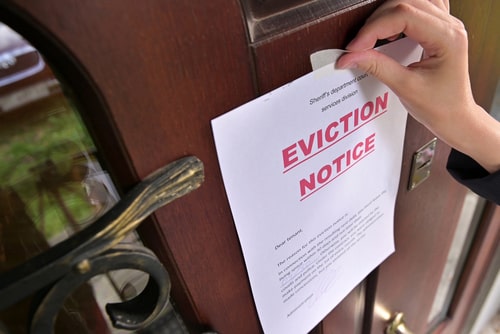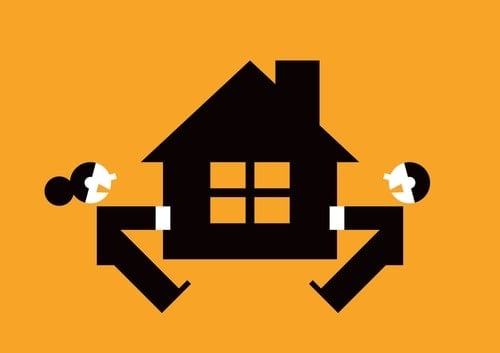
Eviction is a scary word for any landlord. However, what’s worse is when you find out the people living in your rental never had a lease in the first place! When that occurs, or when there is an unauthorized occupant – you have squatters. A common misconception is these individuals have no rights because they have no lease, but that is not the case. Therefore, knowing the right way to proceed is essential to protecting your valuable investment property. So, what are squatter’s rights? Moreover, what are your rights as a landlord? Join us below as we break down everything a landlord needs to know to remove squatters from your rental legally.
What is the Definition of a Squatter?
A squatter is any person who unlawfully takes occupancy of an uninhabited residence. When this occurs, it is considered a civil matter and requires a court eviction. That said, several circumstances can lead to the home having squatters. Check out these common examples of situations that lead to squatters –
- An individual who breaks into the vacant property and takes up occupancy
- The victim of a scammer that posts fraudulent rental ads and collects rent
- An authorized tenant who refuses to vacate once the lease term expires
- Existing tenants who stop paying rent per the terms of the lease
In contrast, there is a difference between squatters and trespassers. A trespasser still enters the property illegally, but with other motivations apart from taking up residence. Generally, trespassing results in arrest and criminal charges against the person or persons.
Steps to Take When You Discover Squatters in Your Rental
Discovering an unauthorized person in your rental is a scary and potentially dangerous situation. Therefore, never attempt to take matters into your own hands. Instead, dealing with this situation requires proper legal action. So, follow along with the steps to remove squatters from your rental –

- Contact the Authorities – Finding an unauthorized person in your home could be dangerous. That said, it is important to determine whether the person is a squatter or trespassing on the premises. So, as a landlord, your first step is to contact the police. That way, if it is a trespasser, the police can take immediate steps to remove them. However, if the occupant turns out to be a squatter, the police will let you know.
- Serve an Eviction Notice – Once you know the property has fallen victim to squatters, the next step is to issue proper notice. Ideally, they will leave on their own accord, but if they do not, owners do have recourse. Issuing an eviction notice is a legally binding way to let the squatters know they must vacate the premises.
- File a Civil Claim for Eviction – Each jurisdiction will have certain requirements for eviction proceedings. Therefore, landlords must thoroughly research and comply with all regulations to ensure a smooth eviction process. In addition, owners need to file a civil claim in the courts to remove the tenant legally.
- Eviction by Proper Authorities – After attending a court hearing, the judge will make a decision. Then, presuming the owner has won the case, the court will issue an order of eviction. Ideally, the squatters will vacate without further incident. However, if need be, the authorities can forceable remove the squatters. While this may result in a fee, it is the safest solution to removing unwanted occupants.
Why Must Landlords Deal Squatters Immediately?
Once property owners discover a squatter, the sooner you begin the process of eviction, the better. Failing to take action only bolsters the squatter’s claim to the premises. Furthermore, the longer an unauthorized person is in the home, the greater the risk of property damage. So, by acting immediately, owners can mitigate the risk of the following –
- Trouble Claiming Ownership – The longer a squatter stays, the more opportunity they have to claim ownership.
- Property Damage – The risk of damage only increases the longer an unauthorized person remains on the premises.
- Extended Vacancy – If a non-paying party occupies the rental, that means the landlord cannot rent it to a paying tenant. Therefore, resulting in lost rent, extended turnover time, and longer vacancy periods for the property owner.
- Added Costs – Removing a squatter from your rental can easily rack up expenses such as court fees, repairs, and lost rent, just to name a few.
What are Squatter’s Rights in Virginia?
To answer the question, what are squatter’s rights? First, landlords must research applicable laws in their area. That said, there are some general rules all landlords must abide by. Although frustrating, most states allow squatters to claim possession of the property through “adverse possession.” However, requirements to meet this claim vary from location to location. Below we discuss more of how adverse possession is handled in Virginia.

What are Squatter’s Rights Regarding Adverse Possession?
When a squatter meets certain conditions set forth by the state, they can make a legal claim over the property. Much to the dismay of owners, this is known as adverse possession. Typically, it occurs when a property is abandoned or left to sit vacant, and the occupant does not have permission to be there.
So, what are squatter’s rights to adverse possession?
Laws in Virginia allow a squatter to assume ownership of a property after remaining there for 15 continuous years. However, the statutory period can be as long as 25 years if the property owner is disabled. Furthermore, if the rightful owner regains control of the property at any time, the clock restarts.
What are the Requirements for an Adverse Possession Claim?
Before a squatter can claim adverse possession, they must meet certain criteria in addition to the statutory timeframe. Let’s review the 5 legal requirements for occupation below –
- Hostile Claim – This means that the squatter is on the premises without the owner’s permission. In other words, this does not necessarily mean violence. In fact, hostile possession could result from a good-faith mistake or an awareness that the unauthorized use of the land is trespassing.
- Actual Possession – Simply put, the squatter must be physically present on the property and treat it as though they are the owner. A common way to document such an effort is by showing they have made improvements to the premises through cleaning debris or planting flowers. Squatters can use these improvements or beautification efforts to prove possession.
- Open and Notorious Possession – This comes down to visibility – in other words, is it clear someone is squatting in the home? So, to prove possession, the squatter cannot try and conceal the fact they are on the premises.
- Exclusive Possession – Exclusive possession requires the squatter to have sole possession of the property. Therefore, they cannot share the land or dwelling with other trespassers, tenants, or owners.
- Continuous Possession – As mentioned above, the squatter must reside on the premises for a set statutory timeframe. In Virginia, that timeframe is 15 uninterrupted years.
What Property Owners Cannot Do to Evict Squatters
When it comes to answering the question, what are squatter’s rights, an important aspect is knowing what you cannot do as a rightful owner. Although the squatter did not have permission to set up residence, you cannot simply remove them on your own. Therefore, to protect yourself and your property from further damage, check out these actions to avoid below –
Self-Help Eviction
Attempting to remove a squatter on your own is both illegal and potentially dangerous. So, avoid “self-help” evictions and instead stick to the legal eviction process. To avoid fines or additional litigation, never do any of the following –
- Verbal or physical confrontation
- Removing and discarding the squatters’ belongings
- Cutting off access to utilities
- Installing additional locks or changing the locks
Tips to Preventing Squatters at Your Rental Property
A property owner or landlord cannot be everywhere all the time. Thus, your vacant property could fall victim to a squatter if not properly monitored. So, while no one can predict every vulnerability, consider taking the steps below to prevent squatters in your rental.
- Install a security system with remote viewing capability
- Post “No Trespassing” or “Private Property” signs
- Periodically inspect the property for evidence of squatters
- Entrust a neighbor or local property management firm to check the premises periodically
Protect Your Investment with Property Management
It is not easy to anticipate and prevent every bad scenario that could happen in a rental. That said, hiring an Arlington property management firm is a perfect way to gain the peace of mind you deserve.
At Bay Property Management Group, your dedicated property manager and leasing team will thoroughly screen all applications. This ensures only qualified applicants with a positive rental history get approved for tenancy. In the event a tenant does holdover or squatters are discovered, our team jumps into action. At BMG, our goal is always to protect the property owner’s interests and protect your valuable investment. To learn more about our services and how we can help maximize your investment, give us a call today.
